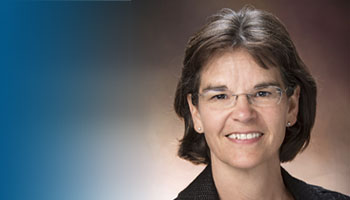HOW CAN WE HELP YOU? Call 1-800-TRY-CHOP
In This Section
Studying the Way Physicians Learn: Q&A With Dorene Balmer, PhD

Dorene Balmer, PhD, studies the way physicians learn through the lens of social science.
How do physicians learn to be doctors? That question led the curious Dorene Balmer, PhD, to study medical education in her doctorate program at Temple University. Today, she shares her expertise at Children’s Hospital of Philadelphia as the director of research on pediatric education. In this role, she not only supports pediatric faculty and trainees in their pursuit of educational scholarship but also conducts research through the lens of a social scientist to try to understand learning as a social activity.
We caught up with Dr. Balmer to discuss her self-proclaimed “nontraditional” research, in which she uses qualitative methodology to study the experience of teaching and learning, and how the findings from her published studies could benefit our physicians-in-training.
Tell us about your area of research expertise — qualitative research for medical education — and why it is important?
I’m a bit nontraditional in that I study how physicians learn through the lens of social science. My data are words, not numbers. So I don’t look at test scores or assessments to make hypotheses about which educational curriculum is better than the other. I study the experience of teaching and learning by using qualitative methodology. I do a lot of interviews, a fair bit of observational data, as well as archival data, such as looking at students’ written reflections.
Much of what I study involves professional identity — how physicians negotiate different roles. In becoming a physician, knowledge and skills are foundational, but they’re not the only thing. It’s also about taking on an identity — being socialized into the profession of medicine — all those things that are so foundational to learning in medicine that are not quantifiable.
For instance, what does it mean to be an anesthesiologist in an academic medical center versus an anesthesiologist in private practice? Then you can bring in different things like, what’s it like to be a woman in anesthesia? What’s it like to be an Asian woman in anesthesia? What’s it like to be an Asian woman in an anesthesia program in New York City, in a program that is predominantly male? It just gets contextually more interesting.
As for why qualitative research for medical education is important, I’d say, because it’s about the receiving end of the student learner and discovering what that experience is like.

Qualitative research for medical education is about the receiving end of the student learner and discovering what that experience is like.
What motivated you to make this your life’s work?
This is a second career for me. I worked as a nutritionist in the neonatal unit here at CHOP for about 12 years. Although I liked the clinical work, what I discovered was that I really loved working with the residents, the pediatricians-in-training.
At the time, I was doing my graduate work in education. I went to a small, private college where I’d sit in the classroom with a curriculum and assignments. This was an extremely different learning environment from that of the residents I worked with at CHOP. They learned in an intensive care unit with attendings and fellows, really sick kids, and distraught parents.
So my question, “How do they learn in such a different context?” drove me to pursue my doctorate at Temple, and while I was there I was bitten by the research bug. My doctoral work gave me the language, the discourse, the understanding, the theory, and the methodology to study learning as a social activity within the context of medicine.
I guess I capitalized on my curiosity and grew into a researcher. I did a postdoc at University of Pennsylvania, trying to blend some of my clinical work as a nutritionist with education. But I realized I just wanted to do education. I don’t practice clinically anymore, but that’s what motivated me — my clinical background.
One of your recent studies published in Academic Medicine followed a cohort of medical students from the start of medical school through residency and into fellowship or practice. Basically, you tracked their career paths for almost a decade! What did you discover, and did any of the findings surprise you?
I was surprised that nobody else had done this type of long-term follow-up. Researchers have followed people through medical school or residency, but to my knowledge, no one has followed a cohort from day one of medical school all the way through residency and into fellowship or practice.
Aside from the uniqueness of the approach, I discovered the idiosyncrasies of trainees’ journeys in medicine. Among educators, there’s a tendency to look at groups of trainees, searching for themes and common things. We’re so oriented around groups that we don’t always appreciate the individual, and because of that, we’re missing a lot of critical and fascinating detail.
For instance, we have standardized training for all pediatric residents. There might be 50 residents in the program, and every single one of them has their own story. What I found was that uniqueness grows and grows, and diversity becomes much more predominant than what they have in common. I don’t think you really get that unless you follow individuals through time as long as I have.
When you start a longitudinal study, you have no idea who’s going to stick with you. It comes down to building a relationship with research participants. And I’m always taking data back to them. My questions sound like, “When we talked last year, you said this was a discovery. Where are you with that now?” So they are always visiting their earlier selves and then telling me about their journey. Essentially, they narrate their own growth.
What I hope people take away from this paper is that we’re pretty good about creating different tracks for students while they’re in medical school, but we need to better support residents who have interests other than clinical work. Certainly, they need to be strong clinicians. But there are other parts of being a physician that we say are important — like physicians should be good communicators, physicians should be aware of global health, physicians should be health system managers — but we don’t really give them the time in residency to pursue that.
Another study you led, “Applying the Theory of Gendered Organizations to the Lived Experience of Women with Established Careers in Academic Medicine,” published this year in Teaching and Learning in Medicine. What insights did you gain about this theory and how it applied to women faculty in medical schools?
The theory of gender organization holds that organizations are built by men, for men. They’re structured and organized in ways that will advantage men over women — at the level of policy and at the level in workplace interactions.
In this paper, we studied women who had established careers and had reached more senior levels. These women came to see academic medicine as a gendered organization only later in their career. It’s as if they had to experience enough microaggressions, enough instances of being disadvantaged, to finally stop and ask, “Is it me? What did I do wrong that I’m not getting paid as much as he is, or that I’m not being offered the leadership position that he is?” Then they realized, it’s not them, it’s the organization. But again, they don’t seem to realize that until they’ve established their career.
This report received the Association of Medical Educators of Europe 2020 Research Paper Award.
Both of these studies provide medical professionals and hospital administrators new perspectives. What are the next steps for translating this research into the workplace?
I think the impact of the content of my research is more subtle than the methodology. I’m currently mentoring three physicians at Penn who are doing longitudinal work. All are fellowship directors, which means they will understand their programs and their trainees’ trajectories better. Improving the education right here at Penn, is very much a local implication of my work.
What do you enjoy most about your work / research?
It’s the people, the relationships — that’s what keeps me in this. It’s the relationships I build with the folks I speak to in interviews, the relationships I construct with mentees and physicians who I get to work alongside and show the ropes to. It’s always the people.


